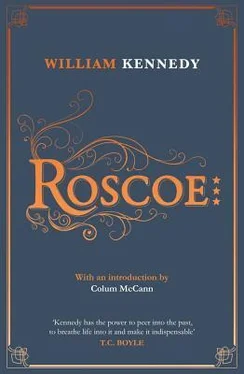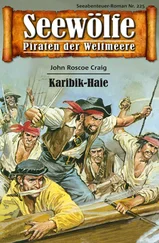“Alex is too smart for that,” Roscoe said. “He’ll come home as fit as he went. We’ll give him a parade.”
“I don’t think he’d march in it.”
“You’re probably right. He has that leveling instinct about himself.”
“He’ll be leveled in other ways. He won’t be as rich as he used to be. None of us will.”
“That’s right. The government will cancel your million-dollar contracts.”
“They won’t need my steel for their tanks.”
“You may have to make refrigerators.”
“If I do that, my salesmen will have to uncover the difference between refrigerators and tanks.”
“Does that make you sad?”
“It makes me poor.”
“You’re not poor, Elisha.”
“No, I still have my shoes.”
“You’re a millionaire. You can’t kid me.”
“At times I’m a millionaire,” Elisha said. “But being a millionaire opens you to criticism.”
“Politics also does that.”
“It’s a short walk from politics to hell,” Elisha said.
“Ah. It’s nice to see that winning the war has lightened your mood.”
“I’m tired of the scandalous liabilities of wealth.”
“Which scandalous liabilities, other than the usual, might those be?”
“Nothing I want to talk about. You’ll know soon enough.”
“A mystery. I’ll try to understand,” Roscoe said. “But at no time have I ever been wealthy enough to have such worries, even though I’ve told people otherwise.”
“I’ve heard you say that.”
“I’m a fraud,” Roscoe said. “I’ve always been a fraud.”
“Nonsense. Nobody ever believes anything you say about yourself.”
“Not even when I’m lying?”
“No, never.”
“What if I said I was quitting the Party?”
Elisha stared at him, inspecting for fraudulence.
“Did you tell Patsy?”
“He wanted to know if I’d told you. Now it’s yes on both counts.”
Elisha’s smile exuded knowledge of Roscoe’s meaning. The man could understand what was unspoken, even unknown. Patsy understood, but could not admit it, for it ran counter to his plans and outside his control. Elisha knew Roscoe’s thoughts without having to ask questions. Their friendship had gone through storms of trouble, rich men’s poverty, broken love. Especially that, for Roscoe had been in love with Elisha’s wife since before the two married. It didn’t interfere with the friendship, for Roscoe’s love for Veronica was impossible and he knew it and mostly let it alone.
“I wonder what you’ll do when you quit,” Elisha said. “You’re not suited for a whole lot of jobs. Will you just loll around spending your money?”
“I haven’t carried it that far yet. But I have to change my life, do something that engages my soul before I die.”
“I’m glad to hear you still have a soul.”
“It surfaces every so often,” Roscoe said.
“You don’t look like a man with a tortured soul. It’s always a surprise how well we dissemble. You’re as good as there is at that game, the way you’ve kept your feeling for Veronica under lock and key — it’s admirable.”
“I have no choice. I have no choice in most things. All the repetitions, the goddamn investigations that never end, another election coming, and now Patsy wants a third candidate to dilute the Republican vote. We’ll humiliate the Governor. On top of that, Cutie LaRue told me this afternoon George Scully has increased his surveillance on me. They’re probably doubling their watch on you, too. You’d make a handsome trophy.”
“Wouldn’t I? Do you think I should worry?”
“Are you worrying right now?”
“No. I’m listening to those bells,” Elisha said. “We should avoid worrying and celebrate peace in the world. They’ll call us Jap-lovers if we don’t.”
“I loved a Jap once,” Roscoe said. “She was unusually lovely.”
“I hope that wasn’t during the war effort.”
“Much earlier.”
“Then you’re safe.”
“We have to battle the plague of jingoism that’s about to engulf us. Some modest degree of intoxication seems the obvious strategy.”
“We could drink here,” Elisha said.
“Drinking in a hotel dining room at a time of jubilation,” said Roscoe, “is not drinking and not serious and not jubilant. We have to mix with the hoi polloi when we drink. We have to bend with the amber waves of grain, roil our juices under spacious skies. We have to join the carnival.”
“EP on the bing,” Elisha said emphatically.
They went downstairs to the Ten Eyck’s bar, which was locked and dark. They walked across Chapel Street to Farnham’s and found no customers, only Randall, the barman, cleaning his sink.
“We’re closed,” he said.
“Closed?”
“The war’s over,” Randall said, taking off his apron. “Alfie says this is no time to drink. Alfie says to me, ‘Close up, Randall. This is a time for prayer and patriotism.’ ”
“I’ll remember Alfie, and I’ll remember you too, Randall,” Roscoe said. “Patriotism is the last refuge of saboteurs.”
“Right you are, Mr. Conway. O’Connor’s and Keeler’s are also closed.” Randall turned off the bar light. “I’ll be open tomorrow after five.”
On the street they heard bells gonging in several churches, trains whistling down at Union Station, the carillon clanging in the City Hall tower, the air-raid siren wailing for the last time. They saw trolleys at a standstill, traffic grid locked at State and Pearl, clots of hundreds, soon to be tens of thousands, moving into pandemonium. They walked up State and tried the bar at the DeWitt Clinton Hotel, but saboteurs had locked it.
“The Kenmore won’t close,” Roscoe said. “The bells of Mahoney’s cash register are the opposite of patriotic.”
They walked back down State Street, the majestic hill of Albany, this very old city in which they both owned uncommon stock and psychic shares. No merchant, no owner of real estate, no peddler or lawyer or bartender, no bum or pickpocket or bookie or politician in the city, not even a stranger walking the streets for the first time, was aloof from the power of these two men if they chose to exercise it; their power, of course, deriving from Patsy, the man without whom. and we all know the rest.
They walked over Lodge Street past St. Mary’s Catholic Church, past the five-story Albany County Courthouse, whose ninety-seven janitors were all hired on Roscoe’s okay. Cars clattered by dragging tin cans, grown men marched along pounding dishpans, and Roscoe and Elisha followed them down Columbia Street toward Pearl, where youths were throwing firecrackers at the antic crowds jamming the intersection.
They entered the side door of the Kenmore Hotel, eternal center of mirth and jazz and women and ready-to-wear myth. Roscoe regularly left his blues here, an uncounted legion of college girls left their virginity here, Bunny Berigan left his cornet here and Bob Mahoney gave it as a gift to Marcus Gorman, and Jack Diamond left the place an enduringly raffish reputation. In short, life without the Kenmore was not life; and at this moment it was noisy and overcrowded, the back bar three deep with revelers, every table full in the Rainbo Room nightclub. Roscoe and Elisha shoved their way toward The Tavern, the Kenmore’s long barroom, where Bob Mahoney was pouring drink as fast as he could move. Roscoe ordered gin and also asked Mahoney to fill his pocket flask for the long night ahead.
“They been here since noontime waiting for the surrender,” Mahoney said. “Another two hours like this, I’ll be out of beer. I’ve never seen a drinking day like this ever, and I include Armistice Day, 1918.”
“Nobody drank in Albany on Armistice Day,” Elisha said. “I was here. We all had pork chops and went to bed.”
Читать дальше












